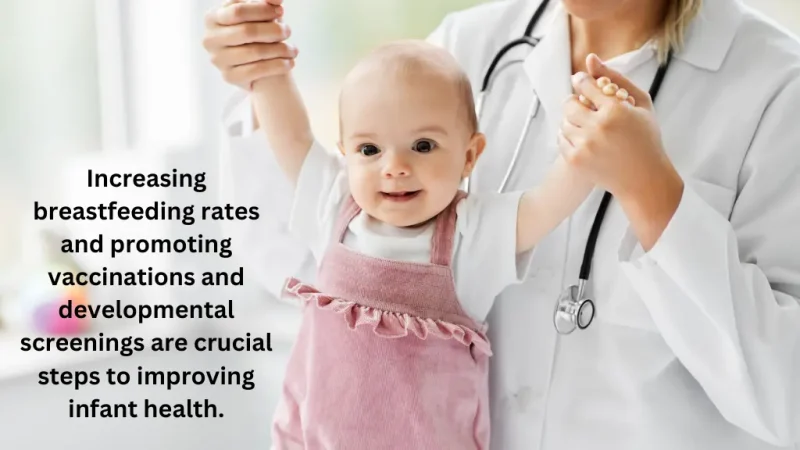From the moment they enter this world, infants rely on us to provide them with the care and nurturing they need to thrive.
Increasing breastfeeding rates and promoting vaccinations and developmental screenings are crucial steps to improving infant health.

In this article, we’ll explore the multifaceted aspects of infant health and uncover practical strategies to give our little ones the best possible start in life, covering topics such as safe deliveries, prenatal care, nutrition, immunizations, developmental screenings, and early childhood development.
How to improve infant health?
Increasing breastfeeding rates, ensuring complete and timely vaccinations, promoting proper nutrition and developmental screenings, providing quality prenatal and postpartum care, and fostering a nurturing environment through positive parenting practices and early childhood development programs are key strategies to improve infant health.
Safe Delivery and Postpartum Care
A healthy beginning starts even before an infant takes their first breath. Ensuring a safe delivery and providing attentive postpartum care is crucial for both the mother and the baby.
Encouraging prenatal checkups, advocating for skilled birth attendants, and promoting access to quality healthcare facilities can significantly reduce the risk of complications during and after delivery.
Like a delicate seedling, an infant’s health is fragile and requires meticulous nurturing. Postpartum care plays a vital role in supporting the mother’s recovery and establishing a strong foundation for the baby’s development.
Providing emotional support, promoting proper nutrition, and offering guidance on newborn care can empower mothers and create a nurturing environment for their little ones.
Prenatal Care

Prenatal care is like tending to a garden before the first bloom appears. Regular checkups, proper nutrition, and a healthy lifestyle during pregnancy lay the groundwork for a baby’s well-being.
By fostering a strong connection between expectant mothers and healthcare providers, potential risks can be identified and addressed early on.
Just as a gardener carefully tends to the soil, prenatal care ensures that the mother’s body is prepared to nurture the growing life within.
Education on proper nutrition, exercise, and prenatal vitamins can help prevent complications and ensure that the baby receives the essential nutrients needed for optimal growth and development.
Breastfeeding

Breastfeeding is nature’s way of providing infants with the nourishment they need to thrive. Like a gentle rain nourishing a tender seedling, breastmilk offers a wealth of benefits for both the mother and the baby.
It not only provides essential nutrients and antibodies but also fosters a deep emotional bond between the two.
Encouraging and supporting breastfeeding practices can have a profound impact on infant health. Providing education, creating breastfeeding-friendly environments, and offering professional guidance can empower mothers to embrace this natural and nurturing experience.
By promoting breastfeeding, we nurture not only the physical well-being of infants but also their emotional and psychological development.
Nutrition and Feeding
Just as a plant requires the right balance of nutrients to flourish, infants need a well-rounded diet to support their rapid growth and development.
Ensuring proper nutrition through a combination of breastfeeding, appropriate complementary foods, and a varied diet can help prevent malnutrition and promote overall health.
| Nutrient | Importance |
|---|---|
| Protein | Builds and repairs tissues |
| Iron | Supports cognitive development and prevents anemia |
| Zinc | Aids in growth and immune function |
| Vitamin A | Supports vision and immune system |
| Omega-3 fatty acids | Promote brain and eye development |
Providing infants with a balanced and nutrient-rich diet is like watering a tender seedling – it nourishes their growth and sets the stage for a strong and healthy future.
Immunizations
Immunizations are like a protective shield, safeguarding infants against a wide range of potentially harmful diseases.
By introducing their delicate immune systems to weakened or inactive forms of pathogens, vaccines equip them with the ability to recognize and fight off future infections.
Ensuring timely and complete vaccination coverage is a fundamental aspect of infant health.
Following recommended immunization schedules and promoting widespread access to vaccines can prevent the resurgence of life-threatening illnesses and protect our most vulnerable population.
Developmental Screenings
Just as a gardener monitors the growth and progress of their plants, regular developmental screenings allow us to track an infant’s milestones and identify any potential delays or concerns.
By assessing cognitive, physical, and social-emotional development, healthcare professionals can intervene early and provide necessary support and resources.
These screenings are like gentle checks on a seedling’s progress, ensuring that each stage of growth is unfolding as it should.
By identifying and addressing any developmental challenges early on, we can nurture an infant’s full potential and optimize their chances for a healthy and fulfilling life.
Environmental Factors
The environment in which an infant grows and develops can have a profound impact, much like the conditions in which a plant flourishes or withers.
Factors such as air quality, exposure to harmful substances, and access to clean water and sanitation can significantly influence an infant’s well-being.
By creating a nurturing and safe environment, we can protect our little ones from potential threats and foster their overall health.
This may involve promoting smoke-free environments, advocating for clean air and water initiatives, and raising awareness about the importance of a healthy living space.
Early Childhood Development
The first few years of life are a critical window of opportunity for an infant’s development, much like the delicate period when a seedling emerges and begins to grow.
During this time, the foundation for cognitive, physical, and social-emotional skills is laid, shaping the trajectory of a child’s future.
Investing in early childhood development programs, promoting positive parenting practices, and fostering stimulating environments can have a profound impact on an infant’s growth and well-being.
By nurturing their minds, bodies, and spirits during these formative years, we can help them blossom into healthy, happy, and well-adjusted individuals.
Regular Check-ups and Screenings:
| Age | Recommended Check-ups and Screenings |
|---|---|
| Birth | Newborn screening for genetic and metabolic disorders |
| 1 month | Well-baby visit, developmental screening |
| 2 months | Well-baby visits, immunizations, lead screening |
| 4 months | Well-baby visit, developmental screening |
| 6 months | Well-baby visits, immunizations |
| 9 months | Well-baby visit, developmental screening |
| 12 months | Well-baby visits, immunizations |
| 15 months | Well-baby visit, developmental screening |
| 18 months | Well-baby visit, immunizations |
| 24 months | Well-baby visit, developmental screening |
| 30 months | Well-child visit |
| 3 years | Well-child visit, developmental screening |
Regular check-ups and screenings are like tending to a garden, ensuring that each delicate plant receives the care and attention it needs to flourish.
By adhering to recommended schedules and staying vigilant for potential issues, we can catch and address concerns early on, nurturing our infants’ growth and development.
Integrated Approach
Improving infant health requires a holistic and integrated approach, much like cultivating a thriving garden where various elements work in harmony.
By combining efforts across healthcare, education, policy, and community initiatives, we can create a comprehensive support system that nurtures our youngest members from every angle.
Collaboration among healthcare providers, policymakers, educators, and community organizations can foster a nurturing environment that addresses the multifaceted needs of infants and their families.
Through this integrated approach, we can ensure that no aspect of infant health is overlooked and that every child has the opportunity to thrive.
Conclusion
Nurturing the health and well-being of our infants is not just a responsibility; it is an investment in the future of our communities and our world.
By embracing a holistic and integrated approach, we can create a nurturing environment that fosters growth, development, and overall well-being for our youngest members.
Just as a gardener tends to their plants with care and dedication, let us nurture our infants with the same level of commitment and love.
By promoting safe deliveries, encouraging breastfeeding, ensuring proper nutrition and immunizations, and fostering early childhood development, we can give our little ones the strong foundation they need to blossom into healthy, happy, and thriving individuals.
Remember, the seeds we plant today will bear the fruits of tomorrow. Let us work together to create a world where every infant has the opportunity to flourish and reach their fullest potential.
